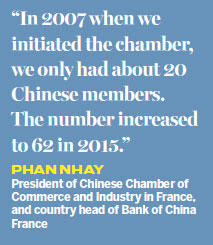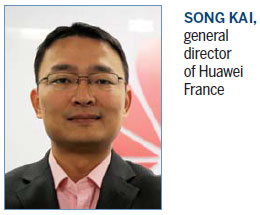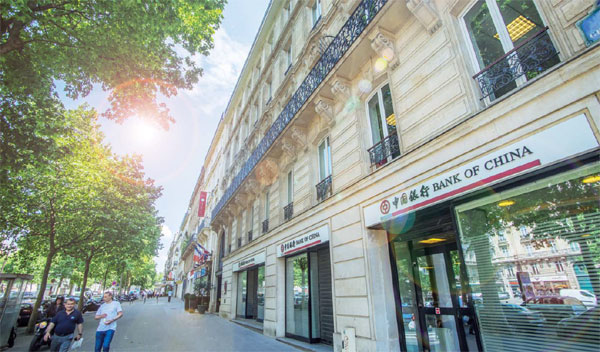Horizons expand for Chinese companies in France
Updated: 2016-01-29 07:49
By Tuo Yannan(China Daily Europe)
|
|||||||||||
Chinese companies investing in France are entering a new era of opportunity, one that is likely to continue with government officials and industry leaders expressing optimism for surging Chinese investment in France in 2016.
While both countries can build on a remarkable history and culture, it is their modern-day role, with China as the largest developing and emerging market and France as a core member of the European Union that gives rise to optimism about the future.
"In the past half century, the China-France relationship has been strategic, in the forefront of China's relationship with Western countries," says Gao Yuanyuan, counselor of economic and commercial affairs in the Chinese embassy in France. "Chinese-French economic and trade relations are an important part of this strategic partnership and both countries have an important impact on the world economy."
|
Bank of China's office building in Paris. The bank works with many French companies, such as Renault and Airbus, on renminbi transactions and trades. Photos Provided to China Daily |
Since the establishment of diplomatic ties in 1964, Gao says, both countries have forged a mutually beneficial relationship in many fields.
But in recent years, the promotion of business ties has seen remarkable progress and Gao notes that China has become France's largest trading partner in Asia, while France is China's fourth-largest trading partner in the European Union.
Indeed, Chinese investment in France has been rising and the combined direct investment was more than $4.4 billion by the end of 2013, up more than 12.6 percent year-on-year, according to the National Bureau of Statistics of China.
France has seen several significant Chinese investment projects in the past two years. Chinese giant Fosun clinched control of Club Mediterranee, the French holiday group, for $1.3 billion, and China General Nuclear Power Group, the country's biggest nuclear power reactor operator, signed a partnership deal with French energy giant EDF to build a nuclear power plant in the United Kingdom.

When China and France established diplomatic relations in 1964, bilateral trade volume was only $100 million, while in 2014, this figure had surged to $56 billion. Cooperation spans many sectors, such as nuclear energy, high-speed rail, aviation and aerospace, Gao adds, pointing to further investment in green energy, healthcare, agriculture, food, finance and e-commerce.
This means that Chinese companies have a bigger presence in the country, according to Phan Nhay, president of Chinese Chamber of Commerce and Industry in France, and country head of Bank of China France.
"I have witnessed Chinese enterprise groups establish an ever-increasing presence over the past 10 years in France. In 2007 when we initiated the chamber, we only had about 20 Chinese members. The number increased to 62 in 2015."
Gao says that in the past 40 years "since China's reform and opening-up, French investment in the Chinese market has grown significantly, covering all areas of industry and services. Chinese investment in France has also seen a rapid increase in recent years. By the end of September 2015, cumulative investment from China to France had reached $8.64 billion, and large investments and cooperation projects continue to emerge.
The trend is obvious, says Phan. "Especially in the past two or three years, the pace of investment has risen sharply and is increasing. Many projects are worth more than $1 billion in investment terms".
Phan points out that a decade ago, Chinese companies had entered the French market in just a few areas such as nuclear energy, finance and aviation. But now Chinese investment covers a multitude of sectors, including chemicals, public services, vehicle manufacturing, aerospace, nuclear power plants, telecommunications, hotels, tourist facilities, as well as shipping and other industries.
Some emerging industries such as financial services, industrial machinery and equipment, renewable energy, airport facilities, agriculture, food and environmental protection have also benefited from Chinese investment.
Chinese advantages
China enjoys a number of advantages in building its partnership with France, according to Gao.
Chinese production capacity and manufacturing output lead the world, while France has advantages in terms of innovation, research and design.

Coupled with this has been a change in perceptions, Phan says. The image of Chinese brands and products has been transformed in the past 10 years. French consumers considered Chinese products cheap in price and also low in quality, but they now enjoy better reputation with obvious quality improvements and increasing technology giving added value. This has led to a major shift in European consumer sentiment.
As the world's biggest telecommunication equipment provider, China's telecommunication giant Huawei has been present in France since 2003. Song Kai, general director of Huawei France, says that at the outset, when selling Huawei's smartphone in France, local telecom carriers were not willing to let the Chinese company print its logo on phones as they thought it might hinder sales.
"Now we have our logo front and back," says Song. "After we built up our brand base on good quality and services, local consumers recognized our brand, and are willing to pay a premium for our products." In 2014 the company became the only Chinese brand to enter the French International Brand Rank.
Huawei is not the only Chinese company to have witnessed the change in perceptions. Sichuan Changhong Electric Co Ltd manufactured China's first TV sets in 1972.
But when the company established its European office in 2005 it encountered a negative brand perception.
"In the early stages when French customers were buying our products, they asked us to remove our logo, because they thought it would be embarrassing having a Chinese brand in front of their friends in their living room," recalls Ning Ken, general manager of the company in Europe.
So we tested the market with our 32-inch set, which can be put in the bedroom and that was more readily accepted by customers. Now our brand is welcomed by customers and can be found at many electronic equipment stores.
"In 2000, just 150,000 sets were sold in Europe but in 2014 we sold 1 million. Now overseas sales account for around 20 percent of our sales," Ning says, stating that the goal is to reach 2 million sets in sales annually in the next three years.
The French service industry has also attracted many Chinese companies. As the largest bank for renminbi overseas trading, Bank of China works with many French companies, such as Renault and Airbus, on renminbi transactions and trades.
The yuan is used in more than 44 percent of bilateral transactions between the two countries and will become an increasingly important currency in the near future, the bank's president Chen Siqing says. This is a major turnaround, he added, as only three years ago just 6.5 percent of transactions between France and China were settled using the yuan.

To cater to growing market needs, a Bank of China renminbi clearing center opened in Paris in 2014, and it became the first Chinese bank in France providing yuan clearing services.
Last year, during Premier Li Keqiang's visit to France, the countries decided to launch a third-party market cooperation agreement, marking a new stage for Chinese-French cooperation.
This means that through joint development, investment, and production in some third-country markets, both countries will bring more products made by both countries to the global market, and the codevelopment model will become a prime example for other Western countries to working with China in the future, Gao says.
Challenges remain
Even though the French have introduced more favorable policies for Chinese investors, such as faster processing for visas and local residency permits, there are still many challenges for Chinese companies entering the French market, says Phan.
Labor and tax laws are very different from Chinese ones, he explains. For example, French tax law has more than 1,000 pages and changes every year, but every company must understand it when entering the market.
"Due diligence is very important for a Chinese company considering entering the European market. Some Chinese companies encounter difficulties or are even forced to exit the French market due to lack of due diligence," Phan adds.
This viewpoint is echoed by Wu Shaohua, head of the French division of the Export-Import Bank of China. Wu stresses the importance of Chinese companies being up to date on the French legal framework and conducting due diligence before rushing into unfamiliar market territory.
tuoyannan@chinadaily.com.cn
(China Daily European Weekly 01/29/2016 page1)
Today's Top News
Record number of Chinese tourists visited UK in 2015
Foreigners fill in Spring Festival courier gap
UK adventurer dies on solo journey
Families of expats in China can stay longer
China's growth envy of developed world
Foreigners find hard to buy China's rail tickets
Rags to riches saga underlines China's transformation
Leaders address Iran's thirst for growth
Hot Topics
Lunar probe , China growth forecasts, Emission rules get tougher, China seen through 'colored lens', International board,
Editor's Picks

|

|

|

|

|

|







